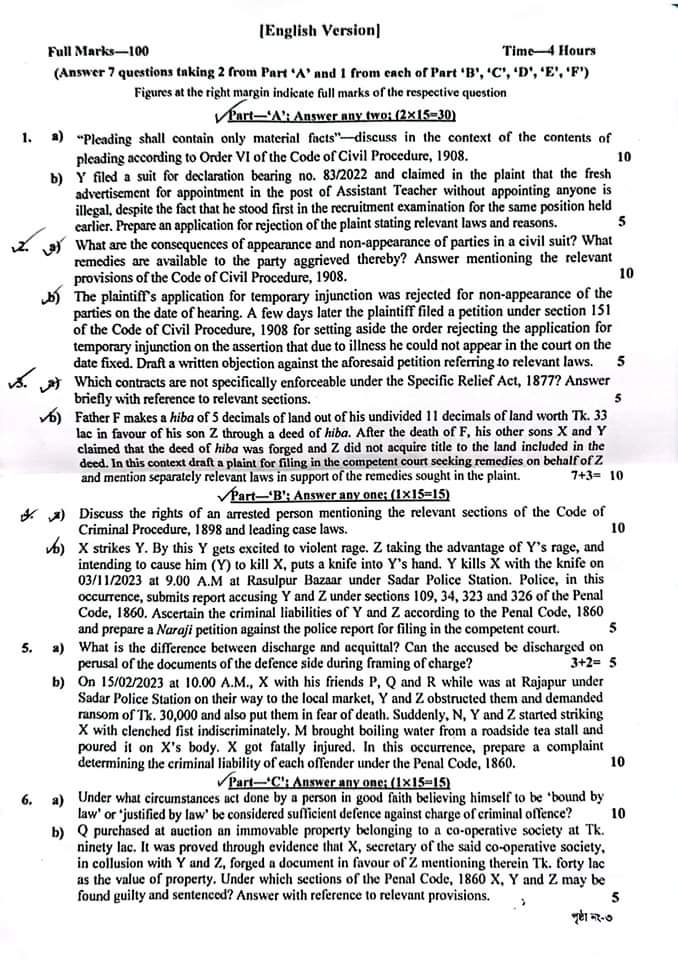The Contract Act, 1872: Definition, Formation and Essential Elements of a Contract
Introduction:
Sir
William Anson observes:
“The Law of Contract is intended to ensure that what
a man has been led to expect shall come to pass that what has been promised to
him shall be performed”
Modern business is mostly built on the law of contract. The Contract act 1872 governs the law of contract in Bangladesh.
Definition of Contract:
An agreement between private parties creating mutual obligations
enforceable by law is said to be a contract. The basic elements required for
the agreement to be a legally enforceable contract are: mutual assent,
expressed by a valid offer and acceptance; adequate consideration; capacity;
and legality. A valid contract makes legal relation between the contracting parties.
Section 2(h) of the
Contract Act specifies the
definition of Contract as such:
“An agreement enforceable by law is a contract.”
To be a contract, an agreement is necessary and that agreement must be
lawful and enforceable by law. As such “All contracts are agreements but all
agreements are not contract” Thus, A contract is thus the combination of two
ideas namely agreement and obligation.
Formation and Elements
of Contracts: To form a
contract the following basic steps should be complied with:
q Contract= Agreement + Enforceable By law
q Agreement= Promise + Consideration
q Promise =Proposal +. Acceptance
Essential
Elements: A valid contract contains
following elements:
1. Offer and acceptance
2. Intention to
make legal relations
3. Lawful
consideration
4. Capacity of
parties
5. Free consent
6. Lawful object
7. Writing and registration
8. Certainty
9. Not expressly declared void
Proposal and Acceptance:
q Proposal/
Offer: Section 2(a): When one person signifies to
another his willingness to do or to abstain from doing anything, with a view to
obtaining the assent of that other to such act or abstinence, he is said to
make a proposal.
q Acceptance:
Section 2(b): When the person to whom the
proposal is made signifies his assent thereto, the proposal is said to be
accepted. A proposal, when accepted becomes a promise.
|
Illustration: let’s consider you want
to buy a book. You proposed the seller to give you that book at 100 taka and
the seller happily accepted your price. Here your offer is a proposal
and the positive response by the seller is acceptance. |
Essential rules regarding a valid offer:
An offer may be ‘express ‘ or ‘implied’:
q Express Offer: M says to N that he is willing to sell his motorcycle to him for 20,000 tk. This is an express offer.
q Implied Offer: Bangladesh
Railway Authority runs trains on different routs to carry passengers at the
scheduled fares. This is an implied offer by the BRA.
q An offer must contemplate to give rise to legal
consequences and be capable of creating legal relations.
q The terms of the offer must be certain and not loose
or vague.
Illustration: X purchased a horse from Y and promised to buy another, if the first one proves lucky. X refused to buy the second one. Y could not enforce the agreement, it being loose and vague ( Taylo vs Portington (1855,44 E.R. 128)
q An offer may be specific or general.( to any
specific person or in general.)
q An
invitation to treat/ offer is not an offer: An offer must be distinguished from an invitation to offer/ treat.
"An invitation to treat is a mere declaration of willingness to enter into
negotiations; it is not an offer, and cannot be accepted so as to form a
binding contract.” (Duhaime's Offer and Acceptance). For example,
an advertisement for sale of goods by auction, catalogues of price or display
goods with price, A notice that goods will be sold by tender. These do not
amount to offer rather invitation to treat/offer.
q An offer can be made subject to any terms and
conditions but not any vague or fraudulent term.
q A counter or cross-offer does not make contract
unless accepted.
q An offer may be revoked, if it is not accepted within specified reasonable time or the condition specified in the offer is not fulfilled or it is rejected by the offeree.
Essential rules
regarding a valid Acceptance:
q Acceptance must be given only by the person to whom
the offer is made.
q Acceptance must be absolute and unqualified.
q Acceptance must be expressed in some usual and
reasonable manner, unless the proposal prescribes the manner in which it is to
be accepted.
q Acceptance must be communicated by the acceptor.
q Acceptance must be given within a reasonable time
and before the offer lapse and/or is revoked. (Shree
Jaya Mahal Cooperative Housing Society vs. Zenith Chemicl Works Pvt. Ltd.
(1919, AIR Bonm.211)
q Acceptance must succeed the offer.
q Rejected offer can be accepted only, if renewed. (Hyde vs. Wrench, 1840, 3 Beav. 334)
Communication of Offer,
Acceptance and Revocation:
Section 4 & 5 of
the Act says:
q The
communication of offer is complete when it come to the knowledge of the person to whom it is made.
q The
communication of acceptance is complete,
§ As against the proposer- when it is put in the course
of transmission to him.
§ As against the acceptor- when it comes to the
knowledge of the proposer.
q The
communication of a revocation is complete
§ As against the person who makes it- when it is put
into a course of transmission to the person to whom it is made. i.e. when the
letter of revocation is posted.
§ As against the person to whom it is made- when it comes to his knowledge. i. e. when the letter of revocation is received by him.
Promise and
Consideration:
q Promise:
Section 2(b) articulates that “A proposal, when accepted, becomes a promise.” That
means when is offer is presented and before the other party and the other party
accepts it becomes a promise.
q Promisor
& Promisee: Section 2(c) provides “The person who presents the offer is named as promisor and
the person accepts the promise is named as promisee.”
q Consideration:
section 2(d) of the act provides
that “When, at the desire of the promisor, the promisee or any other person has
done or abstained from doing, or does or abstains from doing, or promises to do
or to abstain from doing, something, such act or abstinence or promise is
called a consideration for the promise.”
Illustration: Suppose,
Rahim and Karim made a deal that Rahim would sell 100 apple to Karim for 1000 taka. In the
deal, both of them considered something [100 apples and 1000 taka] for this
contract as consideration.
Agreement:
If the elements of promise and consideration are fulfilled, it will be an agreement.
As section 2(e) of the Act specifies
“Every promise and every set of promises forming the consideration for each other is an Agreement.”
Agreement enforceable
by Law is Contract:
Section 10 of the Act
provides: What agreements are contracts
All agreements are contracts
if they are made by the free consent of parties competent to contract,
for a lawful consideration and with a lawful object, and are not
hereby expressly declared to be void.
Nothing herein contained shall
affect any law in force in Bangladesh, and not hereby expressly repealed, by
which any contract is required to be made in writing or in the presence
of witnesses, or any law relating to the registration of documents.
Following agreements
are generally not enforceable by law:
- An
agreement made by a person not competent to enter into a contract; u/s
10
- Contracts
not having lawful consideration or object; u/s 10
- An
agreement made in restraint of a marriage or trade; u/s 26 & 27
- An
Agreement made without consideration u/s 25
- An
Agreement of wager; u/s 30
- An
Agreement contingent on impossible events; u/s 36
- An
Agreement to an impossible act; u/s 56
Therefore, after meeting all these elements and criteria an agreement can
be called a contract.
Person Competent to
Contract:
Section 11 of the Contract Act, 1872 provides,
“Every person is competent to contract who is of the
age of majority according to the law to which he is subject, and who is of sound
mind, and is not disqualified from contracting by any law to which
he is subject.”
q The applicable law here to ascertain the age of
majority is The Majority Act 1875. According to section 3 of the Act, the age
majority is eighteen years.
q So, a person not being 18 years of old (minor) is not competent to enter into a contract . A contract made by a minor is void ab-initio. (Mohori Bibee V/S Dharmodas Ghose - Ilr (1903) 30 Cal 539)
Sound mind:
Section 12 deals with sound mind competent to make a contract.
Section 12 provides that,
A person is said to be of sound mind for the purpose
of making a contract if, at the time when he makes it, he is capable of
understanding it and of forming a rational judgment as to its effect upon his
interests.
A person who is usually of unsound mind, but
occasionally of sound mind, may make a contract when he is of sound mind.
A person who is usually of sound mind, but occasionally of unsound mind, may not make a contract when he is of unsound mind.
Consent: Section 13
says “Two or more persons are
said to consent when they agree upon the same thing in the same sense.”
Free consent: Consent is said to be free when it is not caused by-
(1) coercion, as defined in section 15, or
(2) undue influence, as defined in section 16,or
(3) fraud, as defined in section 17, or
(4) misrepresentation, as defined in section 18, or
(5) mistake, subject to the provisions of sections 20, 21 and 22
N.B. An agreement made without free consent of
either party makes the contract voidable; u/s 19.






